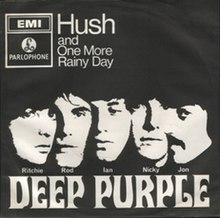Hush (Billy Joe Royal song)
This article needs additional citations for verification. (June 2014) |
| "Hush" | ||||
|---|---|---|---|---|
 Cover of the 1967 Norway single | ||||
| Single by Billy Joe Royal | ||||
| B-side | "Watching from the Bandstand" | |||
| Released | September 1967 | |||
| Recorded | 1967 | |||
| Genre | Swamp rock[1] | |||
| Length | 2:30 | |||
| Label | Columbia | |||
| Songwriter(s) | Joe South | |||
| Producer(s) | Joe South | |||
| Billy Joe Royal singles chronology | ||||
| ||||
"Hush" is a song written by American composer and musician Joe South, for recording artist Billy Joe Royal, whose single peaked at number 52 on the Billboard Hot 100 on 28 October – 11 November 1967,[2] and No. 45 in Canada.[3] South himself recorded the song in 1968, and included it on his second album, Games People Play.[4]
Deep Purple and Kula Shaker had later hits with covers of the song, in 1968 and 1996 respectively.
Billy Joe Royal version
The chorus begins "Hush, hush, I thought I heard her calling my name", which is a takeoff from the traditional gospel song lyrics "Hush, hush, somebody's calling my name". Session musician Barry Bailey, who later became the lead guitarist for the Atlanta Rhythm Section, plays guitar on the track. The promo clip for Billy Joe Royal's release of the song was filmed at the boardwalk amusement park and outskirts of an unidentified Southern beach town.
Deep Purple version
| "Hush" | ||||
|---|---|---|---|---|
 Cover of the 1968 UK single | ||||
| Single by Deep Purple | ||||
| from the album Shades of Deep Purple | ||||
| B-side | "One More Rainy Day" | |||
| Released |
| |||
| Recorded | April 21, 1968 | |||
| Studio | Pye, London | |||
| Genre | Psychedelic rock | |||
| Length | 4:24 | |||
| Label |
| |||
| Songwriter(s) | Joe South | |||
| Producer(s) | Derek Lawrence | |||
| Deep Purple singles chronology | ||||
| ||||
| Audio sample | ||||
| "Hush" | ||||
|---|---|---|---|---|
 Cover of the 1988 German single | ||||
| Single by Deep Purple | ||||
| from the album Nobody's Perfect | ||||
| B-side | "Dead or Alive" (live), "Bad Attitude" (live) | |||
| Released | June 1988 | |||
| Recorded | 1988 | |||
| Studio | Pye, London | |||
| Genre | Rock style: Blues Rock[5], Hard Rock[6] | |||
| Length | 3:32 | |||
| Label | ||||
| Songwriter(s) | Joe South | |||
| Deep Purple singles chronology | ||||
| ||||
The song was subsequently recorded by British hard rock band Deep Purple for their 1968 debut album Shades of Deep Purple. The track became the group's first hit single peaking at number 4 on the Hot 100 on 21–28 September 1968 and number 2 in Canada while going largely unnoticed in the United Kingdom. A live, US-televised version of "Hush" appeared as a bonus track on the 2000 CD-reissue of the Shades of Deep Purple album.
In 1968, Hugh Hefner introduced Deep Purple, who performed live on the Playboy After Dark TV series. After Hefner heard a ghost story from Jon Lord and had a guitar lesson from Ritchie Blackmore, Deep Purple performed "Hush" which is available in the Playboy After Dark -2nd Collection 2007 DVD release.
In celebration of the band's 20th anniversary, Deep Purple re-recorded the song in 1988 for their album Nobody's Perfect. The track was released as a single and reached number 62 on the UK singles chart and number 44 on the US Hot Mainstream Rock chart.
"Hush" is one of four songs originally recorded with vocals sung by Rod Evans that the band have performed with Ian Gillan on vocals later on. Others are "Kentucky Woman", originally from the album The Book of Taliesyn from 1968; "Mandrake Root" from the same album that originally featured "Hush"; and "Bird Has Flown" from the album Deep Purple, or Deep Purple III, released in 1969. The song can be heard in the movie "Bad Times at the El Royale." The song was also featured in Quentin Tarantino's 2019 film Once Upon a Time in Hollywood.
Other versions
- Jenny Rock, a Canadian artist, recorded a French adaptation version in 1970 entitled Mal (produced by Michel Pagliaro).
- Kula Shaker recorded a version which peaked at No.2 in the UK Charts in 1997 and was used on the soundtrack to the blockbuster movie I Know What You Did Last Summer.
- Somebody's Image recorded a version that was a minor hit in Australia in 1967.
- Love Affair recorded a version for their 1968 album The Everlasting Love Affair in 1968
- The Partridge Family performed a version on their TV series, with David Cassidy on vocals.
- Milli Vanilli recorded a version on their debut album All or Nothing in 1988.
- Funky Junction recorded a version of "Hush" on their only album Funky Junction Play a Tribute to Deep Purple in 1973. The band featured Phil Lynott, Eric Bell, and Brian Downey from Thin Lizzy.[7]
Personnel
1968 Deep Purple version
- Ritchie Blackmore – guitar
- Rod Evans – lead vocals
- Nick Simper – bass guitar, backing vocals
- Ian Paice – drums
- Jon Lord – Hammond organ, backing vocals
1988 Deep Purple version
- Ritchie Blackmore – guitar
- Ian Gillan – vocals, harmonica
- Roger Glover – bass
- Ian Paice – drums
- Jon Lord – organ, keyboards
References
- ^ "What Is Swamp Rock?". ThoughtCo. Retrieved October 28, 2018.
- ^ "Billy Joe Royal – Chart history". Billboard. Retrieved June 25, 2014.
- ^ [1]
- ^ https://www.discogs.com/Joe-South-Games-People-Play/release/2045389
- ^ https://www.discogs.com/Deep-Purple-Hush/release/887941
- ^ https://www.discogs.com/Deep-Purple-Hush/release/7439276
- ^ Alan Byrne, "Thin Lizzy: Soldiers of Fortune", Firefly, 2004
